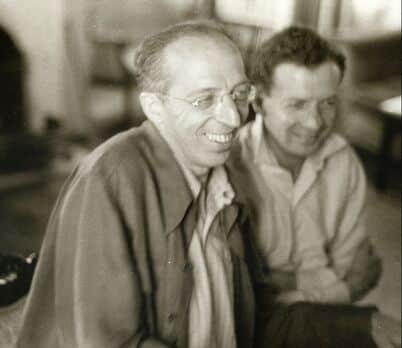Ruth Leon recommends… Aaron Copland and Benjamin Britten
Ruth Leon recommendsAaron Copland and Benjamin Britten
The two most significant composers of their generation – Benjamin Britten and Aaron Copland – both died this week in, respectively, 1976 and 1990. (So did Cicero but he died in Rome in 43 BC so he doesn’t really belong in this item, I guess).
Copland was 90, Britten 63, and they operated within the same musical sphere of contemporary classical composition at the same moment in history. Copland’s contribution to American music and Britten’s to Britain were equally important and it is is hard to imagine their musical century without them.
Benjamin Britten’s range of works including opera, other vocal music, orchestral and chamber pieces. His best-known works include the opera Peter Grimes (1945), the War Requiem (1962) and the orchestral showpiece The Young Person’s Guide to the Orchestra (1945).
After the success of Peter Grimes, he wrote 15 more operas, establishing himself as one of the leading 20th-century composers in the genre. In addition to large-scale operas for Sadler’s Wells and Covent Garden, he wrote chamber operas for small forces, suitable for performance in venues of modest size. Among the best known of these is The Turn of the Screw (1954). Recurring themes in his operas include the struggle of an outsider against a hostile society and the corruption of innocence.
Aaron Copland’s contribution was equally impressive. He was an American composer, critic, writer, teacher, pianist, and conductor of his own and other American music. Copland was referred to by his peers and critics as the “Dean of American Composers“. The open, slowly changing harmonies in much of his music are typical of what many consider the sound of American music, evoking the vast American landscape and pioneer spirit.
Works in this vein include the ballets Appalachian Spring, Billy the Kid and Rodeo, his Fanfare for the Common Man and Third Symphony. In addition to his ballets and orchestral works, he produced music in many other genres, including chamber music, vocal works, opera, and film scores.
I find it interesting that while both Britten and Copland thought of themselves as orchestral composers, they are best known today for their operas and ballets.
Here’s Britten’s Young Person’s Guide to the Orchestra, in a clear and assessible version, performed in Sydney, Australia, by some very young musicians, the YouTube Orchestra, conducted by that excellent musical pedagogue Michael Tilson Thomas.
Here too is another version, touchingly performed in isolation at the beginning of Covid lockdown when the musicians of the Royal Philharmonic Orchestra couldn’t perform together and played in isolation, each in their own homes, not knowing if they’d ever play together again. Without any visible means of support, some of the musicians make a touching appeal to the audience for donations to keep them going during that very difficult time. That comes before the music and serves to remind us of Covid and what an unhappy and uncertain time it was for all of us and for artists in particular.
This version is held together by their Associate Conductor, Alexander Shelley, who narrates and explains each section. This works so well as an introduction to orchestral playing and to the instruments that it will give anyone unfamiliar with the way an orchestra works an easy way in.
Not to neglect Copland, here is his Appalachian Spring Suite, the Philharmonia Orchestra delicately conducted by Santtu-Matias Rouvali, the Philharmonia’s Principal Conductor. In this part of the ballet, a hopeful young Pioneer couple prepare for their wedding day.
Both these concerts were recorded in 2020, in the height of the Covid-19 pandemic.






Comments